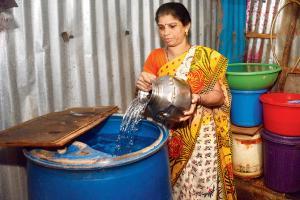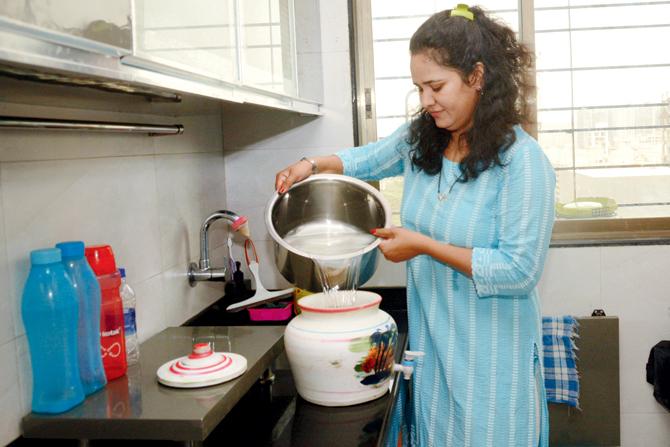Two families from the suburbs, one that gets water once in two days, and another that has suffered a similar fate but now enjoys plenty, talk of forced austerity

Swati Sanjay Shirke stores water that they receive from a nearby well, in buckets at home. Pics/Satej Shinde
'All my life, I've hardly seen water'
Swati Sanjay Shirke,
Malad East
At Swati Sanjay Shirke's jhopdi in Ambedkar Nagar, Malad East, the kitchen is not just where they cook, but also where they store. The "mori", abutting it, has been seized by an assortment of 12 differently-sized buckets, which Swati has stockpiled inside. There are more, which come out on "dry days", she informs. "We get water, once every two days, for an hour," she says. "So, I need to store whatever little we get."
ADVERTISEMENT
The Shirkes live on land, which according to the Mumbai Development Plan is inside the Sanjay Gandhi National Park, and thus, falls in the forest zone. This not only means that their settlements are illegal, but also, that they don't enjoy legal water and electricity supply. While they await rehabilitation from the government, following an HC order in 1996, families like Swati's struggle with basic amenities. Swati, who works as a domestic help in Santa Cruz, moved here in 1991, after she got married.
"Till until last year, either me or my husband and children would go and collect water in handis from the nearby well, and fill it in these buckets," she recalls. Last year, residents managed to get a connection from the well to their homes. They pay R200 a month for an hour's supply of water, every two days, and at erratic hours - sometimes as late as 2 or 3 am. Some locals also managed to fit a tap through an illegal water connection, but with one tap for 2,800 families in the neighbourhood, it's impossible to get water from there, she says.
At Swati's home, water is gold. "We bathe with only one bucket of water, and sometimes even half, when my two daughters, who are married, come visiting with their kids," she says. "Though I have a washing machine, I only use it to rinse the clothes in soap. After that I remove the clothes, and wash it with my hand," she says. She is even more austere with her cooking. When preparing rice, she uses less water than required for boiling. "All my life, I have hardly seen water. And, when you don't have enough of something, you learn to do without it," she says.

'We value water more now'
Manju Patil,
Dahisar East
Five years ago, starting the day at 5.30 am and standing in a long queue to fill buckets from a private water tanker was routine for Manju Patil. "My husband and I lived in a water-starved high-rise in Virar. All the tenants were allotted a total of 15 minutes to fill four buckets of water from the tanker," the 35-year-old recalls.
Today, however, things have changed. Her day begins at 6 am, not to fill water, but to take her dog out for a walk. "In our new home in Dahisar, we get 24X7 water supply. But, because I have been on the other side of the fence, I value water more. I have even instructed my househelp to avoid wasting water during her chores. My husband is careful about even a leaking faucet."
Manju wishes all the other 195 families in her Dahisar East-based building use water judiciously. "I don't believe in using water purifiers as they reject a certain amount of water containing dissolved solids. Instead, I boil about 10 litres of water every alternate day. This drinking water lasts for my husband, dog and me for about two days. Similarly, I use the washing machine only twice every week. The regular clothes are put for a quick wash as it requires little water. If everyone puts in such minimal efforts, no family in the city will be deprived of regular water supply," she says.
Catch up on all the latest Mumbai news, crime news, current affairs, and also a complete guide on Mumbai from food to things to do and events across the city here. Also download the new mid-day Android and iOS apps to get latest updates
 Subscribe today by clicking the link and stay updated with the latest news!" Click here!
Subscribe today by clicking the link and stay updated with the latest news!" Click here!






